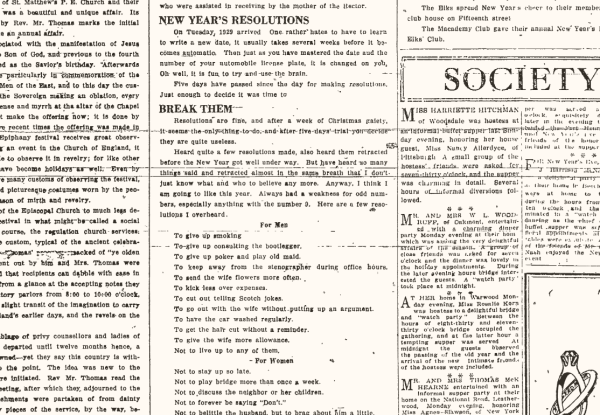New Year’s resolutions: a ritual as enduring as the calendar itself. Every January, we vow to transform into better versions of ourselves—and by mid-month, we’re already laughing at the futility of it all. But don’t worry, you’re in good company. It turns out that even in 1929, folks in Wheeling were breaking their resolutions faster than you can say “gym membership.”
I recently stumbled upon a gem of an article from the Wheeling Register, dated January 6, 1929. Titled “New Year’s Resolutions,” it’s a tongue-in-cheek commentary on the fleeting nature of those well-intentioned promises. The author playfully notes, “Five days have passed since the day for making resolutions. Just enough to decide it was time to BREAK THEM.” Some things never change.
1929 Resolutions: A Snapshot of the Times

The article lists resolutions overheard around town, divided neatly into categories for men and women. While some are relics of a bygone era (giving up bootleggers and poker, anyone?), others feel surprisingly modern. Take this gem for men: “To go out with the wife without putting up an argument.” For women: “Not to use the family car, and forget to fill the gasoline tank.” As the writer puts it, these resolutions were likely “made during a stress of emotion anyway.”
Even Eugene Field’s poem included in the article—lamenting a failed attempt to quit smoking and swearing—is a masterful ode to broken promises. Here’s a snippet:
“I felt so lonesome like, anon
While pining for a smoke
That, brooding all my grief upon,
An oath was almost spoke;
An oath! When I had just foresworn
All words that vicious be!
Nay, rather than be tempted more,
…Return, O pipe, to me!”
And the final punchline? After falling back into his old habits, Field closes with:
“So, of my resolutions, two
Have vanished in the air,
The third shall stick my lifetime through,
For—@$#% me, I’ll not swear!”
It’s as if the poet’s pen knew what January would bring: good intentions, meet human nature.
A Modern Twist on Breaking New Year’s Resolutions
Fast-forward to today, and my mother-in-law (bless her sense of humor) has written a poem that could easily sit alongside the 1929 article. Like the author of that bygone piece, she’s embraced the futility of resolutions with wit and self-awareness.
It had snowed throughout the night,
A beautiful sight to see.
Every branch clothed in white,
On every single tree.
Too cold for me to go outside.
Inside, nothing to do.
I began to feel like the boy and girl
From The Cat in the Hat by Dr. Seuss.
“The sun did not shine,
It was too wet to play,
So, we sat in the house
All that cold, cold wet day.”
Wrapped in the silence and deep in thought
Of New Year’s promises I could make,
Wondering if they would all be kept
Or if each one I would break.
I could resolve to lose some weight,
But sweets I do adore.
I would trudge through all that snow
If I thought, I needed more.
I could promise to spend less money
On things that I don’t need.
To know how futile that vow would be,
The previous paragraph you must read.
I could pledge to improve my diet
By eating more leafy greens.
But only if covered in milk chocolate
Or only in my dreams.
I heaved a sigh with the realization
That resolutions aren’t for the weak.
Being honest with myself I saw
There isn’t one I would keep.
Once I saw how utterly useless
Each resolution would be,
I sat bored in the silence
Waiting for that Cat to rescue me.
-Miriam Hess
Her verses capture the universal truth: we’re great at thinking about self-improvement but not so great at doing it. Wrapped in humor and a touch of nostalgia, her poem reminds us that it’s okay to laugh at our own contradictions.

Timeless Truths About Resolutions
What struck me most about pairing these two pieces—the 1929 article and the modern poem—is how little has changed. Resolutions remain an exercise in hope, self-reflection, and, inevitably, good-natured failure. Whether it’s swearing off sweets or vowing to “go out with the wife without putting up an argument,” our ambitions often collide with reality by mid-January. It’s no wonder there’s even a day dedicated to it called “Quitters Day,” celebrated on the second Friday of January to mark when most resolutions start to fade.
But maybe that’s the point. Resolutions, broken or kept, are a reminder of our shared humanity. They’re about trying, failing, and trying again—with a wink and a smile along the way.
Breaking Your New Year’s Resolutions
So, here’s to breaking New Year’s resolutions, a tradition as old as time. Laugh at your failures, celebrate your attempts, and remember you’re in good company. Whether you’re channeling a 1929 writer, a modern poet, or just yourself, resolutions are best enjoyed with a healthy dose of humor. After all, isn’t life more fun when you don’t take it too seriously?
We at Weelunk and Wheeling Heritage wish you an amazing 2025—filled with laughter, growth, and plenty of moments that remind you it’s all part of the fun!
What New Year’s resolutions do you know you’ll likely break, but should still give yourself grace for?



